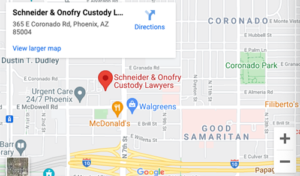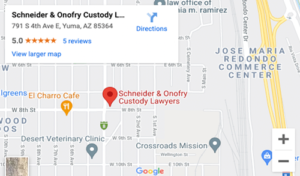Divorce Lawyers in Phoenix, Arizona

Divorce is the only logical recourse when a marriage is broken and cannot be fixed. However, thoughts of divorce and separation are daunting, and can leave individuals in a constant state of panic, or stressful worry. Divorce is one of the most stressful life events according to the Holmes and Rahe stress inventory scale addressing changes that will most certainly impact a daily living situation, finances, and children. Concern of the unknown may cause some individuals to stay in a negative, or dangerous family situation for longer than they should. Consultation with Phoenix family law attorneys at Schneider & Onofry, P.C. is the first step to addressing fears and welcoming necessary changes for better emotional health when a marriage no longer works.
Will I be able to afford a divorce action?
Divorce actions can be costly, depending upon the amount of joint property a married couple has and how many children are identified in the custody agreements, and fiscal support process. Other matters that can drag out the process address alimony, which may be necessary if one spouse gave up, or reduced employment to attend to family needs. Hostility can prolong a divorce action, resulting in more billable hours, more court filings and higher attorneys’ fees. The average costs for a divorce in Arizona can be in the thousands, with an initial case filing fee of $349 but the good news is that Phoenix divorce attorneys will discuss all available payment options and fees on the initial consultation, so it does not hurt to find out what your options may be. Counseling and mediation may also be options to keep divorce costs at a minimum. Talk to a competent divorce lawyer in Phoenix Arizona regarding concerns over divorce actions that can be costly, stressful and time consuming, causing emotional and financial turmoil that may require professional and impartial support.
What are the requirements to get a divorce in Phoenix Arizona?
A person can file for divorce if they meet the basic state requirements after a marriage is deemed permanently broken including:
- In Arizona, one of the parties must have lived in the county of filing for at least 90 days before filing and for 6 months with children if there are children involved.
- Grounds for Filing. Arizona is a no fault state meaning so long as one spouse avows there are irreconcilable differences and no prospect of reconciliation, the marriage can be terminated.
- The Petitioner is the person filing the divorce action, and the Respondent is the other spouse.
Can I get a divorce from a covenant marriage?
Individuals can be divorced from a covenant marriage when it is irretrievably broken. In a covenant marriage, the respondent party must have:
- committed adultery;
- committed a felony and has been sentenced to death or life imprisonment in a federal, state, county, or municipal correctional facility;
- abandoned the marital home for at least one year;
- sexually, or physically abused the spouse, a child, or a relative living in the marital home;
- been living separately and apart for two years;
- been living separately and apart for one year following the legal separation agreement;
- habitually abused drugs and/or alcohol; and
- both parties are in agreement with the divorce.
There are always exceptions to the rules; an attorney consultation is recommended to determine if any of the exceptions apply to your situation.
How do I file an uncontested divorce in Phoenix Arizona?
Uncontested divorce actions are those where both parties to the marriage agree that it should end. There are two types of uncontested divorce actions, one through default and one through consent. Both processes begin the same with legal filing, but a default action occurs when the respondent fails to answer legal divorce documents, in which case the petitioner needs to file a default action to proceed with the finalization of the divorce. Arizona is a no-fault state for non-covenant marriages and state law requires a 60-day waiting period from the date of service before obtaining a final decree, despite the circumstances of the parties.
What does community property mean?
Arizona is a community property state which means that property from marital wages is divided equally between the two parties, unless there is an agreement between the divorcing parties that states otherwise. Community property can include homes, cars, furniture, wedding gifts, wages of one, or both parties, depending on who is working, and any interest, or ownership from business ventures/investments. The debts associated with the items owned by the couple are also divided equally. The court may assign certain debt responsibility to one, or the other spouse. Property from inheritance is considered separate property unless it is comingled with a community property account. Likewise, property each spouse brings into the marriage is considered separate property.
How will child custody and support be addressed?

When minor children are involved in the divorce process, action is required to establish who the child will live with, or if the child’s time will be shared among both parents who will maintain a mutually agreed upon schedule. Child support will also be required to maintain a healthy standard of living for the minor children to the divorce action until they the child has graduated from high school and is 18, unless special circumstances extending support are included in the divorce agreement.
What are the financial matters involved with divorce?
- Alimony – financial support to a divorced party from their former spouse, usually the main financial provider of the marriage, by order of the court to maintain stability for the non-working spouse.
- Child support – financial support based on parental income that will cover living expenses related to childcare, insurance costs, education, and extracurricular activities of children. An attorney with Schneider & Onofry, P.C., a Phoenix Arizona divorce law firm, can go over the Child Support Guidelines in Arizona that need to be completed by both parties to the divorce to clear up disputes regarding transparency of income and assets. Financial support requests and problems can be handled with the assistance of divorce lawyers.. The Arizona Child Support Guidelines follow the Income Shares Model, which considers the income of both parents. Under the model, the total child support amount approximates the amount that would have been spent on the children if the parents and children were living together. Each parent contributes his or her proportionate share of the total child support amount.
- Distribution of marital assets/liabilities – Courts will encourage both parties to the divorce to come to an agreement about asset and liability distribution and if an agreement cannot be made, the court will intervene.
- Emergency support – financial support for separated spouses before the divorce can be finalized on spousal/child support matters.
All of the financial matters should be addressed in the marriage settlement agreement which lays out the responsibilities of each party to the divorce action and addresses the distribution of property, assets, and liabilities. The marital settlement agreement is a formal agreement between the divorcing parties spelling out these agreed-upon terms, including child custody, finances, dependent care, shared visitation, and expenses. Rule 69 of the Arizona Rules of Family Law Procedure allows parties to submit a settlement agreement to resolve their case. A family law judge does not have to accept the terms of that agreement if they believe that provision of property division and debts are unfair, as well as their objective legal decisions regarding child custody in the best interests of children.
A judge will reject an agreement if the court believes the agreement is based on fraud, was signed under duress, does not reflect equitable distribution of debts and assets, or the child custody/support issues are not in the best interests of the children. Divorce attorneys in Phoenix Arizona can assist with the preparation of the marriage settlement agreement.
Settlement agreement considerations.
- How to split the marital property – will one party get the home, while the other gets some joint property, or requirements for one party to buy out the other on their portion of the house?
- Insurance coverage – will one spouse’s coverage persist after the divorce process?
- Marital debt – how will debt be divided taking into consideration exclusions like student loan debt?
- Child custody – what type of custody arrangement will be made and how much will it impact child support amounts?
- Support obligations – how much will be paid, if any, to alimony and child support?
- Considerations for the marriage settlement agreement should include getting the things you want from the divorce, protecting your rights and interests, and pre-empting disputes that my otherwise arise, reducing the chances that an ugly court fight will delay the end of a broken marriage.
When it is time to move on from the marital home, an experienced divorce lawyer in Phoenix is a much needed asset to provide guidance through all of the daunting processes involved in the breakup of a relationship and a family.
Divorce Litigation in Phoenix Arizona.
The Law Firm of Schneider & Onofry divorce lawyers can guide individuals through the very stressful period of life during a divorce, by explaining how the distribution of assets, child support and custody, and family home and finances may be settled between the spouses. It is best to have experienced divorce lawyers in Phoenix who can be objective and provide straightforward document preparation and court representation that minimize attorneys’ fees, and address instances where costs of a divorce can be a hurdle to moving forward with separate lives for both parties.
Sources:
https://www.azcourts.gov/familylaw/Child-Support-Guidelines
Arizona Statutes – Title 12 – Chapters: 401 and Title 25 – Chapters: 312, 329
















